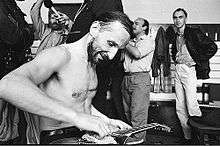Zvuki Mu
| Zvuki Mu | |
|---|---|
 Zvuki Mu before a show in Vilnius, 1988. | |
| Background information | |
| Origin | Moscow, Russia |
| Genres | experimental rock, post-punk, alternative rock, no wave, art punk, lo-fi indie, psychedelic rock (1987 — 1991) |
| Years active |
1983–1990 1993–2005 2015–present |
| Associated acts | Otzvuki Mu |
| Past members |
Pyotr Mamonov Alexander Lipnitsky Alexey Bortniychuk Karen Sarkisov Pavel Hotin Alexey Pavlov |
Zvuki Mu (Russian: Зву́ки Му, [zvʊkʲɪ ˈmʊ], /zvuːkɪ ˈmuː/, may be translated as "The Sounds of Mu") are a Russian alternative rock/indie/post-punk band founded in Moscow in 1983. Lead singer and songwriter Pyotr Mamonov is one of the most revered and eccentric figures of the Russian art scene, whose absurdist lyrics are as playful and disturbing as his vocal style and explosive on-stage presence.[1] The band's sound combined starkly simple yet textured melodies with synthesizer sounds, quite unlike anything else heard in Russian rock at the time. One of Zvuki Mu's albums was produced by Brian Eno. He invited the band to London, to record their first studio album. During this visit they did a gig at the ICA. They had little money, and slept on the floor of poet and writer, Anth Ginn. They spent all their money in the Brixton Exchange Mart, on second hand musical instruments. According to legend, Brian Eno met them at his flat to plan the recording session. He had to go out for a couple of hours and told them to make themselves at home. When he got back they were unconscious on his kitchen floor, surrounded by several hundred pounds worth of empties from his expensive booze collection. Apparently he was not happy. Mamonov had an acrimonious split with the band in the 90s to pursue a solo career and they replaced him. The band toured until 2005. Mamonov still plays some of the old Zvuki Mu songs live, while the rest of the members formed Otzvuki Mu and play the old songs too.
The band's name is best translated as "The Sounds of Mu" (where "mu" has been said to stand for music, Moscow streets, Japanese/Korean negative or a cow's 'moo').
Some of the band's recordings were later used in Mamonov's theatre performances, with only the vocal and guitar parts being sung live.
The 2013 video for The National's single 'Sea of Love', directed by Sophia Peer, was based on Zvuki Mu's video for Grubiy Zakat.[2][3]
In 2015 Mamonov reunioned the band with new members, called "Brand new Zvuki Mu".[4]
Discography
- 1989 — Zvuki Mu / Звуки Му
- 1991 — Transnadyozhnost'/ Транснадёжность
- 1992 — Mamonov I Aleksey / Мамонов И Алексей
- 1994 — Krym / Крым (recorded 1988)
- 1995 — Grubiy Zakat / Грубый Закат
- 1995 — Instrumental'nie Variatsii / Инструментальные Вариации
- 1996 — Zhizn' Amfibiy Kak Ona Est' / Жизнь Амфибии Как Она Есть
- 1996 — Prostie Veshi / Простые Вещи (recorded 1988)
- 1996 — Mamonov 84-87
- 1997 — Legendy Ruskogo Roka / Легенды Русского Рока
- 1999 — Shkura Neubitogo / Шкура Неубитого
- 2000 — Nabral Khoroshih Na Odin Kompakt
- 2000 — Shokoladniy Pushkin
- 2002 — Shkura Neubitogo
- 2002 — Elektro T
- 2003 — Myshi 2002
- 2003 — Zelyonenkiy
- 2003 — Velikoe Molchanie Vagona Metro
- 2005 — Skazki Bratiev Grimm
References
- ↑ "Zvuki Mu - Biography". AllMusic. Retrieved 23 May 2015.
- ↑ "The National pay tribute to Russian band Zvuki Mu in Sea of Love video". HitFix.com. 11 May 2013. Retrieved 23 May 2015.
- ↑ "The National - "Sea Of Love" video". Retrieved 23 May 2015.
- ↑ One of the newest performances of New Zvuki Mu, 2015